What killed off hard rock in the early 1990's?
Now keep in mind that I am merely a fan so my thoughts here are just speculation. My purpose is not to point fingers, but rather to get a handle on what happened to cause the fall of hard rock and metal in the early 1990's. Metal and hard rock went on existing in the underground in the 1990's. However there was a huge shift and many bands lost their record deals and many broke up because of this shift. I think a number of people believe that hard rock and metal was killed off by grunge and that is a huge factor, but I don't think that it was the only reason. I also don't believe that when Nirvana's Nevermind was released that bam! metal was gone. It was far more gradual than that as bands like Nirvana, Alice in chains, Soundgarden and others had been building a following for a few years. It's also not like all hard rock and metal were killed off. Metallica and Guns and Roses were still enjoying success in 1992 and 1993. Def Lepard, Kiss and Aerosmith had successful albums during those years as well. Plus Pantera were really breaking out around this time. Yet the long run that hard rock and metal had through the 1980's was mainly derailed starting around late 1991 and by early 1993 it had changed quite a bit. I will cut to the chase and say that I think that the three main factors that killed off a lot of hard rock in the early 1990's were:
A)The already discussed rise of grunge bands like Soundgarden.

B)Major labels signing many bands like Tyketto, but not having any idea of what to do with them.

C)Labels pushing bands like Warrant who had little staying power.

So I have discussed point A so on to point B and it's a biggie. I think around 1986 that labels really began to see the commercial power of hard rock and metal bands as acts like Van Halen, Ozzy and Bon Jovi had huge success and began to see real mainstream appeal. Plus acts like Metallica, Megadeth and Slayer showed that there was money to be made from heavier bands as well. So in 1987 we see more major labels signing more bands from these genres. That's fine and this was a good year for metal. However between about 1988 and 1991 I think the floodgates opened and a number of labels started signing any band with long hair and Marshall stacks. I think many labels signed bands with hopes of them being the next G-n-R or Poison, but didn't stop to think how they would market these bands. I am no expert on the inner workings of the music industry. However I can do simple math and I know that if there are say six big hard rock bands doing tours then that means the number of opening slots are limited. So if you have 20 young bands with albums due out then not all of them will get a major opening so what kind of tour do they do? Also let's say that in 1987 a young band had their video played three weeks in a row on the Headbanger's Ball. Yet by 1990 there are three times as many bands doing videos then how many times do you think a young band's video is going to be shown? The same goes for radio and magazines is only so much space there as well. Have you heard of Wild Horses, Law and order or Noisy Mama? Maybe not, but all were on major labels between 88-91. What about Powermad, Meliah Rage or Violence? These were all speed metal bands who were on major labels during that same time period. Just a few of the many bands who were signed but got lost in the shuffle. I have heard too many stories of bands being signed during this time period yet they didn't get help finding a tour or they didn't much of a push from the label and they failed after just one album.
Point C is that I think that labels began to push hard rock bands that were more fluff like Poison, Warrant and Trixter. Every one of these bands seemed to be required to do a power ballad or two. Back in say 84-85, there were hard rock bands like Motley Crue, Ratt and Dokken who sold albums yet they weren't just fluff. I think by say 1990 a lot of popular hard rock bands were becoming like flavors of the week. They appealed to teenagers at the time, but their music wasn't strong enough that all of these kids were going to stick with these bands for a long time. I think that the record labels had more of a hand in designing bands to be a certain way between say 88-91. The hard rock bands of that time were becoming more like pop bands and losing that rebellious edge that metal once had. So when stuff like Nirvana, Alice in chains and Soundgarden popped up many young people saw those bands as having more of an edge and being more outside the mainstream. Although they would quickly become the mainstream just as metal and hard rock bands had before them had.
That's my opinion for what it's worth. Feel free to add your own thoughts.
***Happy Valentine's Day as well!
A)The already discussed rise of grunge bands like Soundgarden.

B)Major labels signing many bands like Tyketto, but not having any idea of what to do with them.

C)Labels pushing bands like Warrant who had little staying power.

So I have discussed point A so on to point B and it's a biggie. I think around 1986 that labels really began to see the commercial power of hard rock and metal bands as acts like Van Halen, Ozzy and Bon Jovi had huge success and began to see real mainstream appeal. Plus acts like Metallica, Megadeth and Slayer showed that there was money to be made from heavier bands as well. So in 1987 we see more major labels signing more bands from these genres. That's fine and this was a good year for metal. However between about 1988 and 1991 I think the floodgates opened and a number of labels started signing any band with long hair and Marshall stacks. I think many labels signed bands with hopes of them being the next G-n-R or Poison, but didn't stop to think how they would market these bands. I am no expert on the inner workings of the music industry. However I can do simple math and I know that if there are say six big hard rock bands doing tours then that means the number of opening slots are limited. So if you have 20 young bands with albums due out then not all of them will get a major opening so what kind of tour do they do? Also let's say that in 1987 a young band had their video played three weeks in a row on the Headbanger's Ball. Yet by 1990 there are three times as many bands doing videos then how many times do you think a young band's video is going to be shown? The same goes for radio and magazines is only so much space there as well. Have you heard of Wild Horses, Law and order or Noisy Mama? Maybe not, but all were on major labels between 88-91. What about Powermad, Meliah Rage or Violence? These were all speed metal bands who were on major labels during that same time period. Just a few of the many bands who were signed but got lost in the shuffle. I have heard too many stories of bands being signed during this time period yet they didn't get help finding a tour or they didn't much of a push from the label and they failed after just one album.
Point C is that I think that labels began to push hard rock bands that were more fluff like Poison, Warrant and Trixter. Every one of these bands seemed to be required to do a power ballad or two. Back in say 84-85, there were hard rock bands like Motley Crue, Ratt and Dokken who sold albums yet they weren't just fluff. I think by say 1990 a lot of popular hard rock bands were becoming like flavors of the week. They appealed to teenagers at the time, but their music wasn't strong enough that all of these kids were going to stick with these bands for a long time. I think that the record labels had more of a hand in designing bands to be a certain way between say 88-91. The hard rock bands of that time were becoming more like pop bands and losing that rebellious edge that metal once had. So when stuff like Nirvana, Alice in chains and Soundgarden popped up many young people saw those bands as having more of an edge and being more outside the mainstream. Although they would quickly become the mainstream just as metal and hard rock bands had before them had.
That's my opinion for what it's worth. Feel free to add your own thoughts.
***Happy Valentine's Day as well!
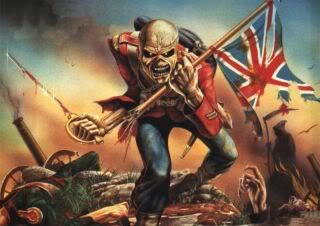

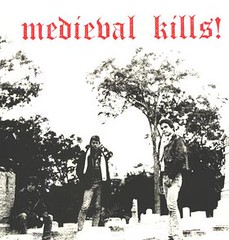
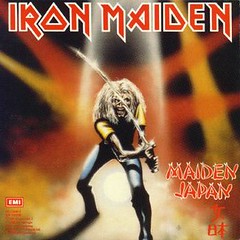

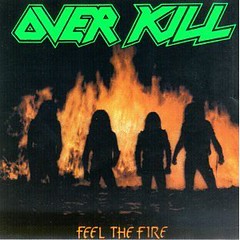
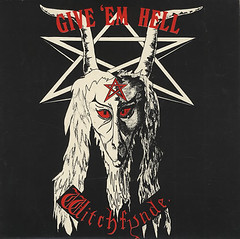
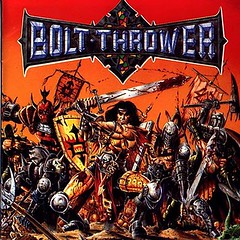
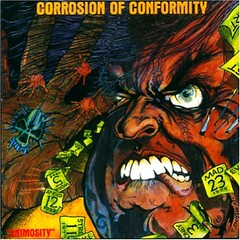
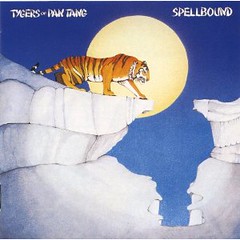
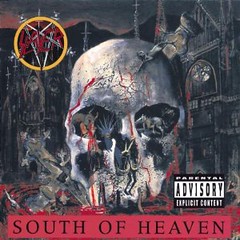

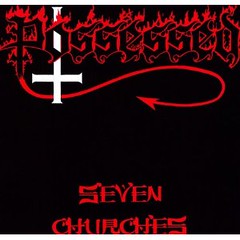
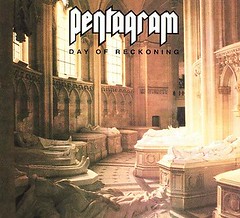
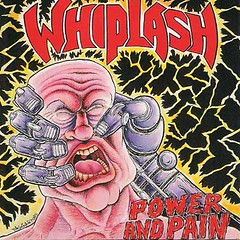
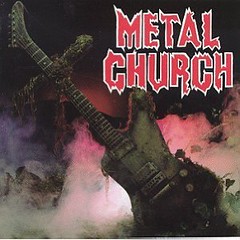
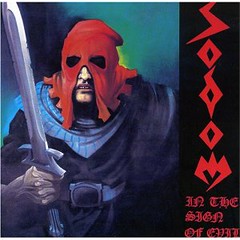
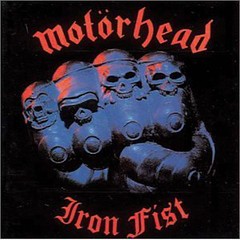

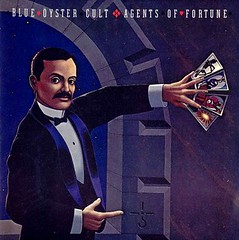
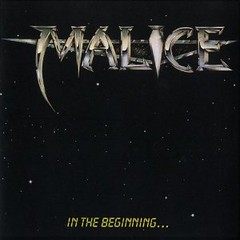
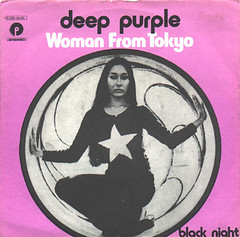
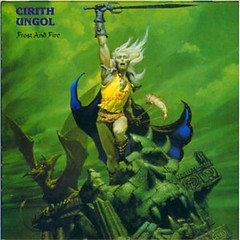
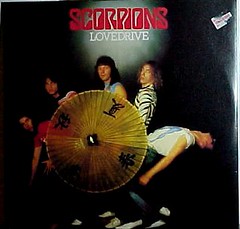
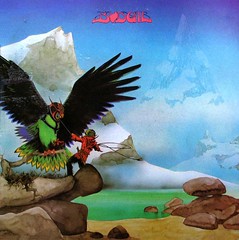
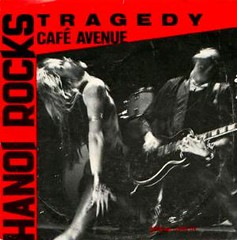
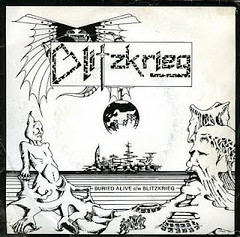
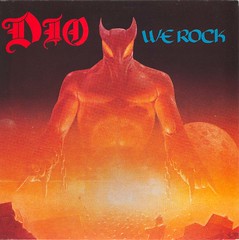

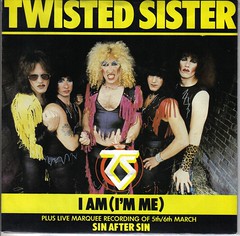
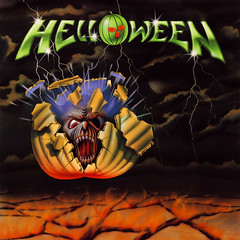
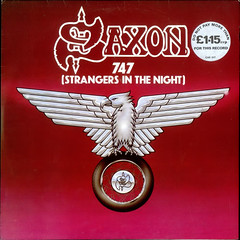
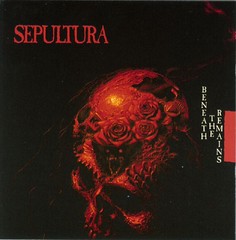
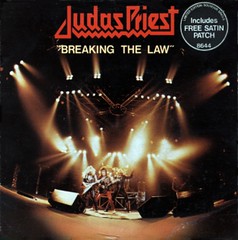
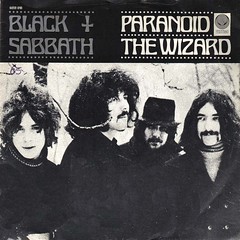
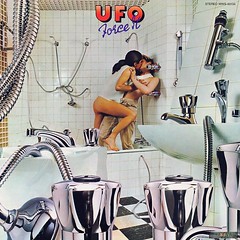
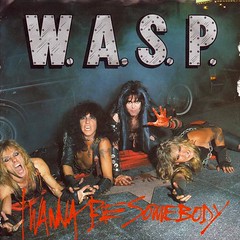
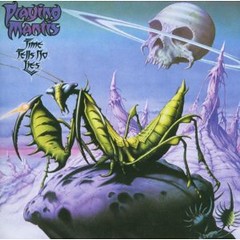

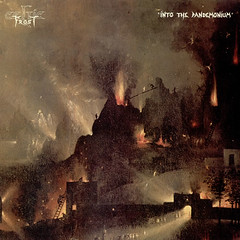
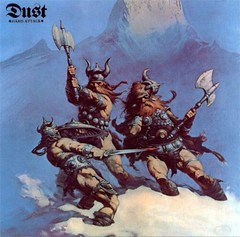

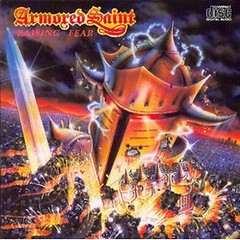
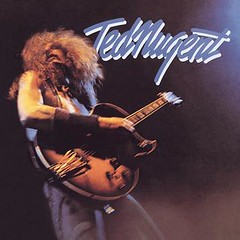
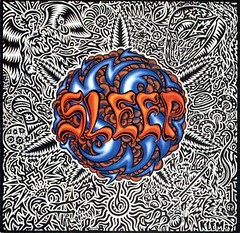
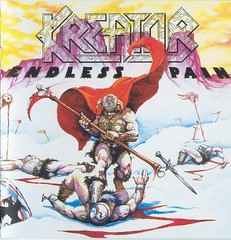
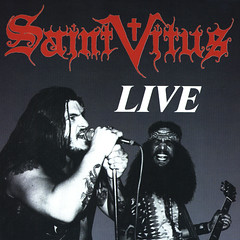
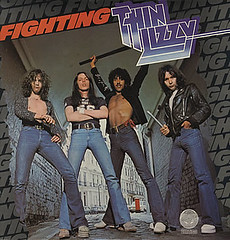

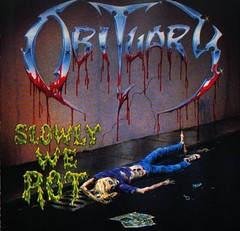
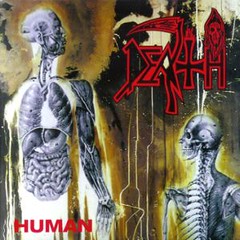



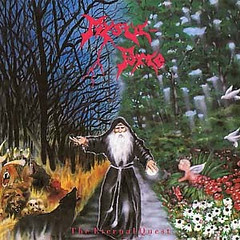








13 Comments:
I'm going to go for the old standby; the media. They wanted the "next big thing" and to really convince us that they had it, something had to die. Grunge was still a heavier rock sound and so the first victims were anyone else with a heavy rock sound.
Grunge, as I remember it, was pushed slightly to the sidelines only a few short years later by the more crap-friendly term, "alternative." Anyone, and I mean anyone, could get a ride on that train. I honestly remember getting a Columbia House magazine that had Hootie and The Blowfish labelled under Alternative. Alternative to what? Good music was my guess. The saddest part in this or any case where the media is blamed is that there is a partner in crime: the consumer. Yes, I'm going to sound self-righteous, but the average consumer says "baa" and tastes great with mint jelly.
Upon further thought, I think some of the glam metal bands hammered their own nails into their coffins. Compare Poison's "Talk Dirty to Me" to "Stand", Warrant's "Cherry Pie" to "Machine Gun", or anything from Dr. Feelgood to Motley Crue's self-titled album (the one with Corabi on board). These bands, while good on anyone from trying something new, tried too hard to adopt all that seriousness that grunge brought to the table. It bombed. But as the Spice Girls would soon prove, the world still wanted to have fun, the hair metal crowd should have stayed true to their roots (bad pun, I know).
A possible exception to this is Skid Row, who I think got better under a more serious, harder sound.
And as much as I think Bon Jovi is crap, I think that's the reason they're still around- they stuck to the cheesy ballads and wuss rock that got them fans in the first place.
Yeah vicious circle, media companies gets onto next big thing... bands wants to make it big and turns their music to next big thing... fans tries to adapt to next big thing. It's all a farce.
I'm sure MTV had a lot to do with it too. Even though a lot of these bands had success for a while it seems like MTV and Pop music snuff the life out of everything pretty quickly these days.
I think you've nailed it with B and C, which are more robust explanations than the easy standby, "it was Nirvana."
The success of the big metal bands in the late 80s--along with the one- or two-hit-wonder pop success of lite metal bands like Trixter, Firehouse, Giuffria, and Y&T--encouraged labels to pick up anything with long hair and a guitar.
When popularity faded a bit, as always happens, the labels did the smart thing and fed new fads. Just as disco rose and fell in the mid- to late-70s and teeny pop rose and fell in the mid-80s, so pop metal rose and fell from the mid-80s through about '91.
Great analysis.
-- david
You did well here, Mark and definitely it's convenient to blame Nirvana, and sure, there's definitely a latitude that should be put in that way, but it was more the fact that the listening public had seen through the labels' gambit to shove worthless crap upon them that to them, Nirvana sound fresh and it sounded real, hence the average folk turned away from pop metal.
You analysis of the labels signing bands and not knowing what to do with them is right on. Did you know there's a still-unrelease Widowmaker album out there? Dee Snider doesn't have the rights to it and it's still sitting in Atlantic's vaults, just shelved in the midst of the great metal kill-off.
What's going on in metal now is the same shit, only it's metalcore, hardcore and teen angst metal of today that is committing the same crimes as the hair band era--everyone doing the same fomulaic bullshit with no integrity, buying into the belief that a fortune is waiting to be made with the right deal and I'm sure they're getting a harsh reality check out there. That's what a lot of them tell me in interviews.
I also blame a lot of the labels for keeping this cycle of blah going, even in the indies. There's a sound to be marketed and because there's triple the bands today than in the 80s, the whole effect is far worse. Trust me, when I gave that load of my promos, I ommitted a lot of the aforementioned soundalike metalcore stuff because if you listen to it all in succession as I have to do, it gets fucking depressing, and I've written in my column and other places that the breakdown is going to kill metal a second time. Mark my words.
You make some great observations Mark and as much as I liked Warrant, they were fluffly. I was still finding my groove at that point. And I agree that Skid Row went in the opposing direction which is why they were one of my favourite bands.
As far as the media/labels are concerned the market gets oversaturated by the same old, as is happening now with metalcore and eventually this will pop and something new will arise from the background. It's a vicious cycle. And we can't forget the sellout factor either.
I'm of the mind that new styles are good and metal will never die, but evolve. What I try to do is stick to the pioneers and those who are stepping away from the current standards. Originality is key.
And lastly, as we can see by the American Idols and such shows the consumers are fickle and there is no way of guessing what the masses will eat up next.
I agree with you Mark, there's not much else left to say that someone else didn't already say.
Phases, I guess, is what it comes down to. Maybe it'll come back around again in some kind of enjoyable form. We'll see.
Mark, EXCELLENT write up! Well thought out and I liked how you expanded beyond the grunge thing.
I have one other theory that I'd like to run by the class...
The music of the late 80's (Metal, Glam, Hair, whatever...) was about EXCESS! Drugs, booze and pussy! There's only so long you can ride that train before it derails.
AIDS came along and made casual groupie sex a scary, life threatening action...the over abundance of drugs and booze killed and ruined several careers. Life sucked as we knew it...I don't think that grunge so much as was created, but simply slid into an available slot in prime time.
It was now "cool" to complain about life, so let's sing about how much life sucks, look dirty and greasy, and stare at our sneakers when we play...Wah wah wah!
Sure drugs and booze will always play some part in rock music...and kill off a few good souls, but it was the excess of the 80's that made is "cool" and "fun", but also helped to kill it...in my opinion.
You're the only other person I 'know' who has even heard of Tyketto...I love that album!
This was a great post. So informative and smart.
Thank you.
A view from across the pond
I saw no distinction between metal and grunge, it was just another variation on the theme, people could listen to Metallica and where a Nirvana t-shirt, it didn’t matter. The only impact on the British scene was an increase in jumpers and the colour green.
Descent rock music disappeared in late 1994 when Oasis had phenomenal success (for an indie band), over the next two years all the metal bands disappeared and all the good indie bands started to sound like Oasis, by 1996 Britpop was so firmly situated that nothing seemed to be able to shift it, it became the most popular style in the country even pushing r’n’b and dance music to the sidelines. Even today they still class it as alternative or indie which is really annoying; it all sounds the same in the end.
I don’t think metal died I just think I lost track of it as it went underground; I took refuge in punk music. As I look around on the internet I am constantly surprised by the amount of stuff that was produce in the dark age of the late 90’s and the amount of artists still performing. It’s costing me a fortune catching up on what I have missed.
Personally 1994 saw huge changes to my social circle with all my friends leaving for university and the birth of my eldest so sometimes I think metal didn’t die I just changed priorities, maybe to many of us changed at the same time.
To me, half of it was over saturation of the market. Record companies of any kind were snatching up any long haired guys that could play half way decent, and in many cases, didn't promote the groups they had.
Too many sound alike bands was the only the beginning. With the new sound Grunge coming out of Seattle, suddlenly, the hard rock bands were no longer feeling the love from the record companies, although the fans were still there. The record company dollars were not.
You can blame the Soundgardens and Nirvanas, and Pearl Jams, but they were the new kids and new sound on the block. The record companies just forgot about the groups that made them millions.
Personally, I hear the word Grunge,and I cringe. It spelled the untimely death of the music I loved.
I'm glad there are a few of us around that are trying to help keep it (80's style hard rock) alive, and breathe some life back into it.
I believe that your last choice was the best. There was just too much fluff and not enough stuff.
Post a Comment
Subscribe to Post Comments [Atom]
<< Home